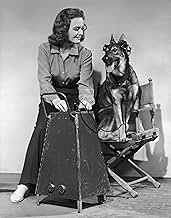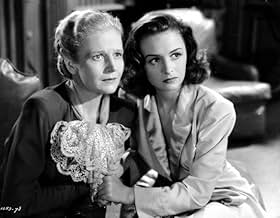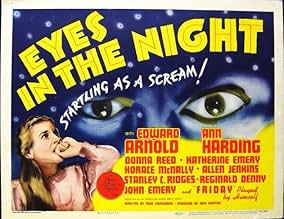IMDb RATING
6.7/10
2.1K
YOUR RATING
A blind detective and his seeing-eye dog investigate a murder and discover a Nazi plot.A blind detective and his seeing-eye dog investigate a murder and discover a Nazi plot.A blind detective and his seeing-eye dog investigate a murder and discover a Nazi plot.
- Director
- Writers
- Stars
Stephen McNally
- Gabriel Hoffman
- (as Horace McNally)
Stanley Ridges
- Hansen
- (as Stanley C. Ridges)
Rosemary DeCamp
- Vera Hoffman
- (as Rosemary de Camp)
Steven Geray
- Anderson
- (as Steve Geray)
John Butler
- Taxicab Driver
- (uncredited)
Edward Kilroy
- Pilot
- (uncredited)
- Director
- Writers
- All cast & crew
- Production, box office & more at IMDbPro
Featured reviews
I'd never heard of this film, but discovered it bundled in with a lot of other 30s/40s B-movies in the "Mystery Classics" collection from Platinum Video. It's a surprisingly good film, really a near-great film that's hobbled a bit by it's middle act.
The first part of the film is really the only part that's a straight-forward detective romp, w/ a blind detective and his seeing-eye-dog and his hired muscle simpleton helping him sleuth out a fairly typical wrongfully-accused-murder plot. This part of the film is all golden, partially, I think, because the Detective's characters (All intended to be recurring characters in an ongoing film franchise that never quite got off the ground after this really good first chapter) feel like they have a past together, they feel like they know who they are, which is unusual for a potboiler of this era.
The second act resolves the murder a bit too quickly - in fact, it's never exactly resolved, the film merely abruptly changes focus from the detective et al to the murderers themselves discussing why they did it. This robs the film of most of it's dramatic strength, and essentially the middle act becomes little more than filler. It's entertaining enough filler - a sort of World War II version of "Wait Until Dark" - but it doesn't really advance the plot much.
The third act is the somewhat-rushed climax/resolution, though it features an unexpectedly cool shootout filmed in a very unusual style, and extended sequence with the detective's amazingly-well-trained dog. (Seriously, this dog is great! He could easily do his own taxes. He makes any other trained film dog - and really most trained film monkeys - look like idiots by comparison). On the whole, the film ends well, but it never fully recovers the momentum it lost by shifting focus in the middle, and as a result the final wrap up just comes across as slightly unsatisfying. It is, however, a more than satisfying introduction to what no doubt would have been a great detective series which, sadly, never really took off. I'm very surprised the concept was never revisited on TV or Radio, since the central character is endlessly entertaining.
One odd note: the ending feels a bit truncated, with some of the action happening off-camera. For instance, early on one of the bad guys is captured and held by the detective's men. Later on, we're shown the detective's men bound and gagged, the bad guy having evidently escaped. Later the bad guy reunites with his own people, but the transition is so abrupt that it feels like we're missing a scene or two. Also, there's a subplot in which the bad guys are hiding family information from one of their own people. This sets up what is obviously intended to be a major plot point, but, in the end absolutely nothing comes of it. Again, is this a missing scene, or simply bad writing? I can't tell.
Still and all, this is a near-classic film with a great character and some fantastic performances that unfortunately hobbles itself. Well worth a viewing, however.
The first part of the film is really the only part that's a straight-forward detective romp, w/ a blind detective and his seeing-eye-dog and his hired muscle simpleton helping him sleuth out a fairly typical wrongfully-accused-murder plot. This part of the film is all golden, partially, I think, because the Detective's characters (All intended to be recurring characters in an ongoing film franchise that never quite got off the ground after this really good first chapter) feel like they have a past together, they feel like they know who they are, which is unusual for a potboiler of this era.
The second act resolves the murder a bit too quickly - in fact, it's never exactly resolved, the film merely abruptly changes focus from the detective et al to the murderers themselves discussing why they did it. This robs the film of most of it's dramatic strength, and essentially the middle act becomes little more than filler. It's entertaining enough filler - a sort of World War II version of "Wait Until Dark" - but it doesn't really advance the plot much.
The third act is the somewhat-rushed climax/resolution, though it features an unexpectedly cool shootout filmed in a very unusual style, and extended sequence with the detective's amazingly-well-trained dog. (Seriously, this dog is great! He could easily do his own taxes. He makes any other trained film dog - and really most trained film monkeys - look like idiots by comparison). On the whole, the film ends well, but it never fully recovers the momentum it lost by shifting focus in the middle, and as a result the final wrap up just comes across as slightly unsatisfying. It is, however, a more than satisfying introduction to what no doubt would have been a great detective series which, sadly, never really took off. I'm very surprised the concept was never revisited on TV or Radio, since the central character is endlessly entertaining.
One odd note: the ending feels a bit truncated, with some of the action happening off-camera. For instance, early on one of the bad guys is captured and held by the detective's men. Later on, we're shown the detective's men bound and gagged, the bad guy having evidently escaped. Later the bad guy reunites with his own people, but the transition is so abrupt that it feels like we're missing a scene or two. Also, there's a subplot in which the bad guys are hiding family information from one of their own people. This sets up what is obviously intended to be a major plot point, but, in the end absolutely nothing comes of it. Again, is this a missing scene, or simply bad writing? I can't tell.
Still and all, this is a near-classic film with a great character and some fantastic performances that unfortunately hobbles itself. Well worth a viewing, however.
Sure, it's pat and simplistic in places and the plot's a little daffy, but it has three major things going for it: an amazing dog named Friday, a delightful performance from veteran Edward Arnold and fine direction by Fred Zinnemann. It could've easily been filler, but Zinnemann has too much respect for his craft and the material to allow that to happen.
As others have pointed out, that dog really is something and nearly steals the show but Arnold is every bit as good. He is particularly amusing in his role within a role where he pretends to be an eccentric, ill-tempered uncle in order to foil the bad guys' dastardly scheme. (And that scheme is a big time McGuffin, no more than an obviously slight excuse to get all the conflicting characters under one roof.) Arnold's Cat & Mouse games with main villains Katherine Emery (resembling Mercedes McCambridge both in looks and delivery) and over-educated "butler" Stanley Ridges are tense and clever.
Zinnemann really shines in one ingenious scene set in a pitch dark basement. Arnold, playing a super smart blind sleuth growls "In the dark! In my kingdom now!" and proceeds to outwit a trigger happy thug. Not unlike the Coen brothers' "Blood Simple" 45 years later, the only light is provided by a number of randomly fired gunshots. Not surprisingly, this technique is effectively taut and unnerving. If you weren't aware who the director was at that point, it's the sort of thing that makes you go running to your film guide thinking "Whoa. Who directed this?"
As others have pointed out, that dog really is something and nearly steals the show but Arnold is every bit as good. He is particularly amusing in his role within a role where he pretends to be an eccentric, ill-tempered uncle in order to foil the bad guys' dastardly scheme. (And that scheme is a big time McGuffin, no more than an obviously slight excuse to get all the conflicting characters under one roof.) Arnold's Cat & Mouse games with main villains Katherine Emery (resembling Mercedes McCambridge both in looks and delivery) and over-educated "butler" Stanley Ridges are tense and clever.
Zinnemann really shines in one ingenious scene set in a pitch dark basement. Arnold, playing a super smart blind sleuth growls "In the dark! In my kingdom now!" and proceeds to outwit a trigger happy thug. Not unlike the Coen brothers' "Blood Simple" 45 years later, the only light is provided by a number of randomly fired gunshots. Not surprisingly, this technique is effectively taut and unnerving. If you weren't aware who the director was at that point, it's the sort of thing that makes you go running to your film guide thinking "Whoa. Who directed this?"
What a gem of a movie! A blind detective, a Nazi plot and the smartest dog I've ever seen all make this a very enjoyable mystery/thriller. Young Donna Reed really is stunning and Mr. Arnold nails it as the blind detective. Great acting all the way around and some plot twists keep you watching. Enjoy it.
Edward Arnold plays a blind detective asked to look into the murder of an actor. Very quickly things become complicated as Arnold realizes that there are sinister forces at work that are not run of the mill.
This is a great thriller. I would love to say mystery, except that the mystery is solved about a third of the way through. Granted there are other details to work out, but the mystery is effectively over. Thats not to say you won't be sitting on the edge of your seat, you will. Arnold is an imposing figure and its a joy to watch this "helpless" man turn the tables on all of those around him. We in the audience know he's far from helpless, having witnessed the opening judo lesson, so we know whats in store for those who think they can get the upper hand on him.
The film isn't perfect. There are a few contrived bits and the end is rushed, still its 80 minutes well spent. The highest praise I can think of is if you're like me you'll probably wish there was more with this character. (Actually there is one more film, made three years later called the Hidden Eye, unfortunately that was it)
8 out of 10
This is a great thriller. I would love to say mystery, except that the mystery is solved about a third of the way through. Granted there are other details to work out, but the mystery is effectively over. Thats not to say you won't be sitting on the edge of your seat, you will. Arnold is an imposing figure and its a joy to watch this "helpless" man turn the tables on all of those around him. We in the audience know he's far from helpless, having witnessed the opening judo lesson, so we know whats in store for those who think they can get the upper hand on him.
The film isn't perfect. There are a few contrived bits and the end is rushed, still its 80 minutes well spent. The highest praise I can think of is if you're like me you'll probably wish there was more with this character. (Actually there is one more film, made three years later called the Hidden Eye, unfortunately that was it)
8 out of 10
Although Edward Arnold did play some other good guys in his career, it's one that's normally associated with villainy. So he must have looked on with gratitude to MGM for allowing him to play Baynard Kendrick's fictional blind detective Duncan MacLain in two films of which Eyes In The Night is the first. My guess is that if Arnold were an MGM contract player the screen might have seen more of the resourceful Duncan MacLain.
Blindness as it has in a lot of people has forced Duncan MacLain to rely on those remaining senses and has honed his intelligence to a fine edge. He thinks pretty fast on his feet, especially after being hired by Ann Harding gains entrance to her household while she's away by convincing her servants that he's a long lost blind uncle. It's from there he finds out what's going on.
Harding hires Arnold because she's concerned that her step daughter Donna Reed is getting in way over her head with actor John Emery. When Emery turns up dead later that's an understatement.
But when Arnold gets into the household and sees what an interesting group of servants Harding and husband Reginald Denny have, he's thinking that romance might not just be at the bottom of this mystery.
Aided by filmdom's most remarkable dog since Rin Tin Tin in the canine of Friday, MacLain is also aided for strong arm stuff by his driver Allen Jenkins. Although as you will see in the film, Arnold when he gets in close is every bit up to the rough house aspect of the gumshoe profession.
The cast is excellent, especially butler Stanley Ridges who becomes Arnold's opposite number in terms of wit and intelligence. A worthy Moriarty type to Arnold's Holmes.
It's too bad that film never saw more of Duncan MacLain.
Blindness as it has in a lot of people has forced Duncan MacLain to rely on those remaining senses and has honed his intelligence to a fine edge. He thinks pretty fast on his feet, especially after being hired by Ann Harding gains entrance to her household while she's away by convincing her servants that he's a long lost blind uncle. It's from there he finds out what's going on.
Harding hires Arnold because she's concerned that her step daughter Donna Reed is getting in way over her head with actor John Emery. When Emery turns up dead later that's an understatement.
But when Arnold gets into the household and sees what an interesting group of servants Harding and husband Reginald Denny have, he's thinking that romance might not just be at the bottom of this mystery.
Aided by filmdom's most remarkable dog since Rin Tin Tin in the canine of Friday, MacLain is also aided for strong arm stuff by his driver Allen Jenkins. Although as you will see in the film, Arnold when he gets in close is every bit up to the rough house aspect of the gumshoe profession.
The cast is excellent, especially butler Stanley Ridges who becomes Arnold's opposite number in terms of wit and intelligence. A worthy Moriarty type to Arnold's Holmes.
It's too bad that film never saw more of Duncan MacLain.
Did you know
- TriviaThe first film in what was meant to be to be a mystery franchise focused on blind detective Duncan Maclain who solved murders with the help of his seeing eye dog, Friday. When the second entry, L'oeil caché (1945), failed to elicit sufficient interest, MGM ended the series.
- GoofsWhen the butler/enemy agent Hansen confronts Duncan MacLean loudly playing the organ in the middle of the night, Hansen ruffles his own hair to appear as if he has been sleeping and just awakened - clearly forgetting that MacLean cannot see his appearance.
- Crazy creditsFriday appears as himself.
- Alternate versionsThere is now a colorized version available. Highly recommended as much of the film is set in the dark which doesn't register well in the b&w original.
- ConnectionsFeatured in Personalities (1942)
- How long is Eyes in the Night?Powered by Alexa
Details
Box office
- Budget
- $433,000 (estimated)
- Runtime1 hour 20 minutes
- Color
- Aspect ratio
- 1.37 : 1
Contribute to this page
Suggest an edit or add missing content

Top Gap
By what name was Les yeux dans les ténèbres (1942) officially released in India in English?
Answer



















